Your Smile is Our First Priority
Below are many of the services and treatments that our office provides. We look forward to providing you with dental care you deserve.
At your initial dental visit your dentist will perform a comprehensive dental exam. At your regular check up exam your dentist will include the following:
• Exam of x-rays
• Gum disease evaluation
• Exam of tooth decay
• Check existing restorations
• Oral cancer screening
• Blood Pressure Screenings

Your personal home care is a very big role in achieving a beautiful healthy smile. Good home care includes: Eating balanced meals and less snacks
• Brushing at least twice a day making sure to get the inner, outer, and biting surfaces of every tooth.
• Flossing at least once a day
• Rinsing after meals if you are unable to brush to remove any food particles. It is important not to rinse after brushing so you don’t remove the fluoride in your toothpaste.
We highly recommend electric toothbrushes because they remove plaque more efficiently.

A fixed bridge is a non-removable appliance that is used to replace missing teeth. The traditional bridge is the most popular type because they resemble your natural teeth and it is usually made of porcelain fused to metal. This bridge consists to two crowns that go over two anchoring teeth and are attached to artificial teeth that fill in the gap created by one or more missing teeth.
Dental bridges are highly durable and will last many years, however they may need replacement or need to be re-cemented due to normal wear.
Reasons for a fixed bridge:
• Fill space of missing teeth
• Prevent remaining teeth from drifting out of position
• Restore chewing and speaking ability
• Restore your smile
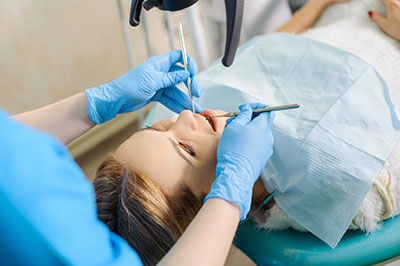
Root canal therapy is needed when the nerve of a tooth is affected by decay or infection. In order to save the tooth the pulp, nerves, bacteria, and any decay are removed and the space is filled with special, medicated, dental materials which will restore the tooth to its full function. Having a root canal done on a tooth is the treatment of choice to save a tooth that would otherwise die and have to be removed. Root canal therapy is very successful and usually lasts a lifetime. On occasion a tooth will have to be retreated due to new infections.
Signs and symptoms:
• An Abscess (pimple like) on the gums
• Sensitivity to hot and cold
• Severe toothache
• Swelling or tenderness
• Sometimes there are no symptoms present.
Reasons for root canal therapy:
• Decay has reached the pulp of the tooth
• Infection has developed inside the tooth or at the root tip
• Injury or trauma to the tooth

Dental cleanings are usually performed by your Registered Dental Hygienist but sometimes your dentist will do it. Your cleaning appointment will include removal of plaque and calculus and teeth polishing.
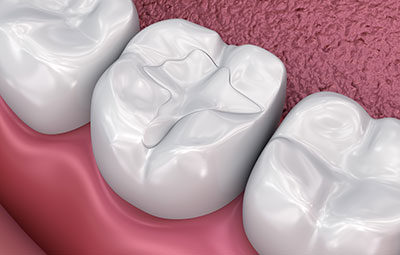
Fillings are used to repair a tooth that is affected by decay, cracks, or fractures. The affected part is removed and then filled with the filling material. There are two different types of filling material, amalgam and composite. You and your dentist can discuss the best option for restoring your teeth!

Composite fillings are tooth colored so they can be closely matched to the color of existing teeth. Since they match they are good for use in the front teeth or more visible areas.
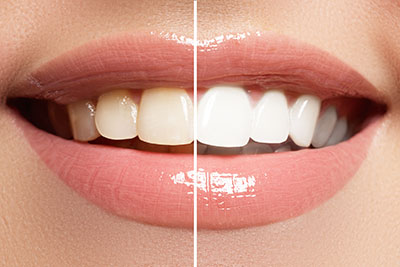
Tooth whitening/bleaching is a simple, non-invasive dental treatment used to change the color of your teeth. It is an ideal way to enhance the beauty of your smile.
There is a number or ways to whiten your teeth. The most popular method is using a home tooth whitening system that will whiten teeth dramatically. One way of home whitening is to purchase white strips or custom bleaching trays. Tooth whitening will only work on natural tooth enamel so replacement of restorations should be done after bleaching so they will match your newly bleached teeth.
Tooth whitening is not permanent. You may need a touch-up every several years, and more often if you smoke, drink coffee, tea or wine.
Reasons for tooth whitening:
• Fluorosis (excessive fluoridation during tooth development)
• Normal wear of outer tooth layer
• Tetracycline (stained due to medications)
• Yellow, brown stained teeth

A crown is a covering that encases the entire tooth surface restoring it to its original shape and size. A crown protects and strengthens the tooth structure that cannot be restored with fillings. There are many different types of crowns to choose from. You and your dentist can discuss advantages and disadvantages of them and choose the one that best suits you!
Reasons for crowns:
• Broken or fractured teeth
• Cosmetic enhancement
• Decayed teeth
• Fractured or large fillings
• Tooth has a root canal
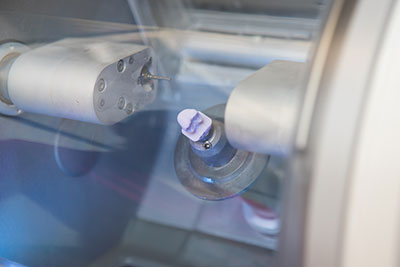
Reasons for onlays:
• Chipped teeth
• Close a space between two teeth
• Cracked or broken teeth
• Decayed teeth
• Worn teeth
• Cosmetic enhancement
• Large or fractured fillings
• Same day crown - no temporary needed

Dental X-rays-Dental x-rays are preventative, diagnostic tools that provide information not visible during the regular dental exam. This information is used to detect hidden abnormalities and complete a treatment plan. Your x-rays will reveal abscesses or cysts, bone loss, cancerous and non cancerous tumors, decay between the teeth, root positions, and problems inside the tooth or under the gum line.
X-rays produce a low level of radiation and are considered safe. When taking an x-ray we will take precautions to limit your exposure by using a lead apron to shield the body, and modern, digital films that cut down exposure time.
A full mouth series is recommended for all new patients. A full mouth series is good for 3-5 years. Bite-wings are taken at recall visits and are recommended once or twice a year to detect any new dental problems.
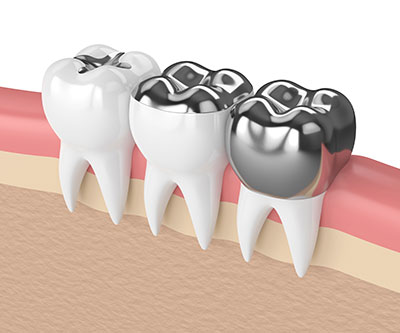
Amalgam is a common filling material used to repair cavities. The material also known as “silver fillings,” contains mercury in combination with silver, tin, copper, and sometimes zinc. Amalgam fillings are very durable and less expensive than composite fillings.

Dental Implants- Dental implants are artificial roots are surgically placed into the upper or lower jawbone by an oral surgeon or a Periodontist and then the restorative (teeth) portion is done by the dentist.
Dental implants are a great way to replace missing teeth and also provide a fixed solution to having removable partial or complete dentures. Implants provide excellent support and stability for these dental appliances. They are very strong, stable, and durable and will last many years, but on occasion they will need to be re-tightened or replaced due to normal wear.
Reasons for dental implants:
• Replace one or more missing teeth without affecting the adjacent teeth
• Resolve joint pain or bite problems caused by teeth shifting into spaces
• Restore a patient’s confident smile
• Restore chewing, speech, and digestion
• Restore or enhance facial tissues
• Support a bridge or denture, making them secure and comfortable

A denture is a removable dental appliance replacement for missing teeth and surrounding tissues. They are made to resemble your natural teeth and enhance your smile. There are two types of dentures, complete and partial. Complete dentures are used when all of the teeth are missing, and partial dentures are used when some natural teeth remain. The partial denture not only fills in the spaces from missing teeth, it also prevents other teeth from shifting. Dentures are very durable and will last many years, but may have to be remade, repaired, or readjusted due to normal wear.
Reasons for dentures:
• Loss of all or several teeth
• Enhance smile and facial tissues
• Improve chewing, speech and digestion
